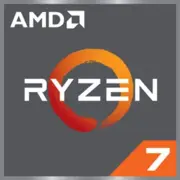AMD Ryzen 7 9700F

About processor
Ryzen 7 9700F is a Desktop processor manufactured by AMD. It was released on September 2025. The CPU is manufactured using the 4 nm fabrication process. It has 8 cores and 16 threads. The CPU uses the AM5 socket. The main feachers of the CPU are: Performance-core Base Frequency - 3.8 GHz, Performance-core Max Turbo Frequency - 5.5 GHz, L3 Cache - 32 MB, TDP - 65 W.
Basic
Label Name
AMD
Platform
Desktop
Launch Date
September 2025
Model Name
?
The Intel processor number is just one of several factors - along with processor brand, system configurations, and system-level benchmarks - to be considered when choosing the right processor for your computing needs.
Ryzen 7 9700F
Code Name
Zen 5 (Granite Ridge)
CPU Specifications
Total Cores
?
Cores is a hardware term that describes the number of independent central processing units in a single computing component (die or chip).
8
Total Threads
?
Where applicable, Intel® Hyper-Threading Technology is only available on Performance-cores.
16
Performance-cores
8
Performance-core Base Frequency
3.8 GHz
Performance-core Max Turbo Frequency
?
Maximum P-core turbo frequency derived from Intel® Turbo Boost Technology.
5.5 GHz
L1 Cache
80 K per core
L2 Cache
1 MB per core
L3 Cache
32 MB shared
Multiplier
38
Bus Frequency
100 MHz
CPU Socket
?
The socket is the component that provides the mechanical and electrical connections between the processor and motherboard.
AM5
Technology
?
Lithography refers to the semiconductor technology used to manufacture an integrated circuit, and is reported in nanometer (nm), indicative of the size of features built on the semiconductor.
4 nm
TDP
65 W
Max. Operating Temperature
?
Junction Temperature is the maximum temperature allowed at the processor die.
95 °C
PCIe Version
?
PCI Express is a high-speed serial computer expansion bus standard used for connecting high-speed components, replacing older standards such as AGP, PCI, and PCI-X. It has gone through multiple revisions and improvements since its initial release. PCIe 1.0 was first introduced in 2002, and in order to meet the growing demand for higher bandwidth, subsequent versions have been released over time.
5.0
Instruction Set
?
The instruction set is a hard program stored inside the CPU that guides and optimizes CPU operations. With these instruction sets, the CPU can run more efficiently. There are many manufacturers that design CPUs, which results in different instruction sets, such as the 8086 instruction set for the Intel camp and the RISC instruction set for the ARM camp. x86, ARM v8, and MIPS are all codes for instruction sets. Instruction sets can be extended; for example, x86 added 64-bit support to create x86-64. Manufacturers developing CPUs that are compatible with a certain instruction set need authorization from the instruction set patent holder. A typical example is Intel authorizing AMD, enabling the latter to develop CPUs compatible with the x86 instruction set.
x86-64
Memory Specifications
Memory Type
?
Intel® processors come in four different types: Single Channel, Dual Channel, Triple Channel, and Flex Mode. Maximum supported memory speed may be lower when populating multiple DIMMs per channel on products that support multiple memory channels.
DDR5-5600
Max Memory Bandwidth
?
Max Memory bandwidth is the maximum rate at which data can be read from or stored into a semiconductor memory by the processor (in GB/s).
89.6 GB/s
ECC Memory Support
Yes
GPU Specifications
Integrated Graphics Model
?
An integrated GPU refers to the graphics core that is integrated into the CPU processor. Leveraging the processor's powerful computational capabilities and intelligent power efficiency management, it delivers outstanding graphics performance and a smooth application experience at a lower power consumption.
No
Miscellaneous
PCIe Lanes
28
Benchmarks
Cinebench R23
Single Core
Score
2255
Cinebench R23
Multi Core
Score
20186
Geekbench 6
Single Core
Score
3346
Geekbench 6
Multi Core
Score
17711
Passmark CPU
Single Core
Score
4717
Passmark CPU
Multi Core
Score
37207
Cinebench 2024
Single Core
Score
141
Cinebench 2024
Multi Core
Score
1335
Compared to Other CPU
Cinebench R23 Single Core
Cinebench R23 Multi Core
Geekbench 6 Single Core
Geekbench 6 Multi Core
Passmark CPU Single Core
Passmark CPU Multi Core
Cinebench 2024 Single Core
Cinebench 2024 Multi Core
Share in social media
Or Link To Us
<a href="https://cputronic.com/cpu/amd-ryzen-7-9700f" target="_blank">AMD Ryzen 7 9700F</a>